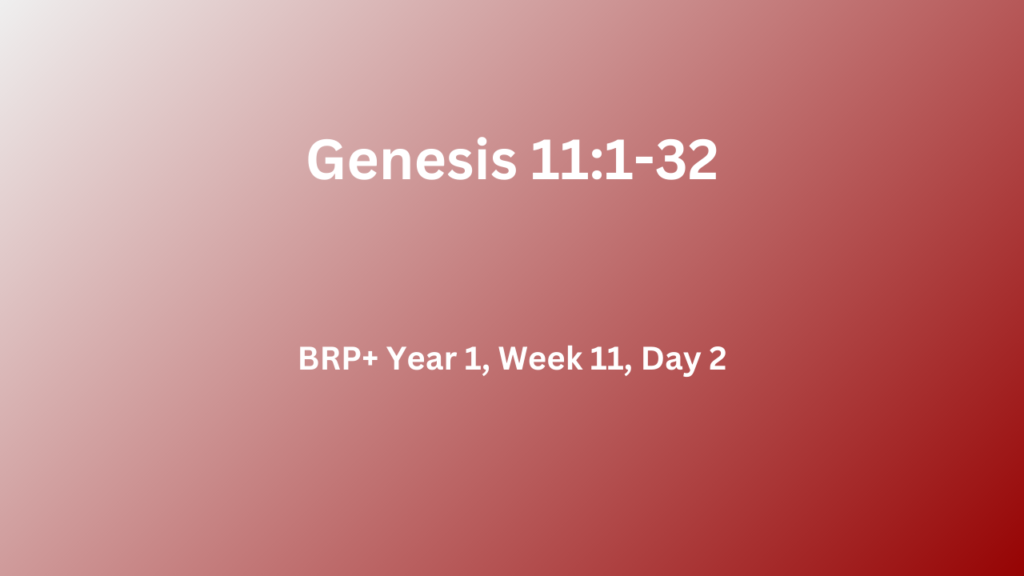Genesis 11:1-32
Q.1. How did the descendants of Noah communicate? Why did they build a city at Shinar? How did God frustrate their plans? What does the name Babel signify? – (Gen.11:1-9)
Every person originally spoke the same language. This chapter explains the origin of the various nations and their tongues. The families spread. Sadly, it took little time for them to forget their Creator, and decide to establish their own super-city, complete with their own religious system – They said, “Come, let us build for ourselves a city, and a tower whose top will reach into heaven, and let us make for ourselves a name, otherwise we will be scattered abroad over the face of the whole earth.” (Gen.11:4). This was in defiance of God’s command to spread throughout the earth (Gen.1:28). The building of cities had been part of humanity’s problem that had resulted in the judgment of the Flood … and would be the undoing of Sodom and Gomorrah (see Gen.4:17; 6:5-7; 13:10-13). God was troubled that almost anything might be achieved if there were no language restrictions or cultural barriers. – The Lord said, “Behold, they are one people, and they all have the same language. And this is what they began to do, and now nothing which they purpose to do will be impossible for them (Gen.11:6). History also shows that an increase in education and technological advances often leads to an increase in godlessness. As in Genesis 1, God again revealed Himself as triune – Let US go down to them and confuse their language (Gen.11:7). The gathering into large cities not only multiplied the people’s potential to pursue corporate goals, but also to increase the incidence of crime and sinfulness. Consequently, the Lord sent a confusion of tongues and languages, so that men could no longer work together in this way. This resulted in their being scattered abroad (see Gen.11:8-9). Why was it called the Tower of Babel? – Therefore, its name was called Babel because there the Lord confused the language of the whole earth; and from there the Lord scattered them abroad over the face of the whole earth (Gen.11:9). Though the people ‘babbled’, the Bible reveals that angels have no language barriers. They can speak in whatever tongue that is necessary to communicate.
Q.2. What was the point of the genealogy of Shem’s line? What do we learn about Terah’s family? What was revealed about Abram and Sarai? – (Gen.11:10-32)
The genealogy in the previous chapter recorded the names of Noah’s descendants. Here we are given the ages and dates of birth of the firstborn sons of Shem’s descendants. Shem did not have a son until he was one hundred years old, just – two years after the flood (Gen.11:10). Before the Flood, men waited decades to produce a firstborn son, and then they had many other children. They usually lived upwards of nine hundred years. After the Flood, there was a rapid decline in longevity, from six hundred years for Shem to two hundred and five years for Abram’s father Terah, and Abram one hundred and seventy-five years (see Gen.11:10-11 c.f. 11:32). Clearly the post-Flood earth atmospheric conditions were markedly different from the conditions of the Pre-Flood earth. The Scriptures recorded a number of interesting facts about Abram’s family. Abram was the firstborn son of Terah. He appears in the genealogy of Jesus (see Mt.1:1-2, 17, and Lk.3:34). Terah, his father, had intended to go to Canaan, the place where the Lord called Abram to settle. However, he stayed part-way at Haran – named after Terah’s son who had died in Ur of the Chaldeans (Gen.11:28, 31 c.f. 12:5). Both Abram and his surviving brother, Nahor were married to Haran’s daughters. Abram’s wife had been unable to conceive any children (see Gen.11:29-30). Nahor stayed at Ur of the Chaldeans in Mesopotamia. Terah took Abram and Haran’s son Lot with him to settle at Haran, part-way to Canaan. Later, Abram would seek for a wife from Nahor’s family for his son Isaac (see Gen.24:1-4, 10). All these factors combined, helped to make Abram the unique man whom God would call to be the father of faith for all nations.

